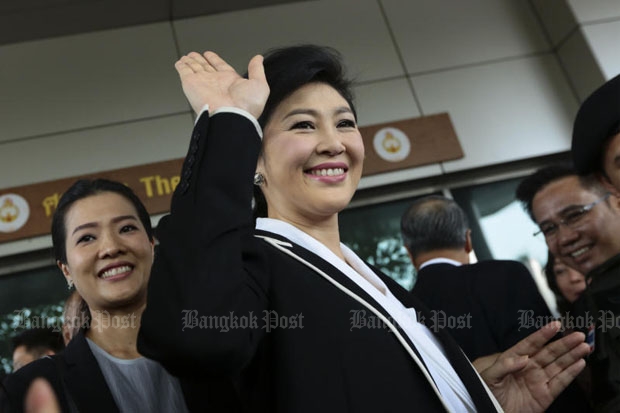
A government committee has concluded that Yingluck Shinawatra must pay 35.7 billion baht in compensation for losses from her rice-pledging programme from 2012-14.
The bills could mount further as the military regime pursues several other cases against the former premier, including compensation for losses from the "poorly planned" responses to the severe flooding in 2011.
Comptroller-General Manas Jamveha, the head of the civil liability panel, said Ms Yingluck was held responsible for 20% of the 178 billion baht in losses resulting from rice pledging in the 2012-13 and 2013-14 crop seasons.
An administrative liability panel ruled earlier that a violation was committed and the civil liability panel was set up to determine the financial damages. Under the chairmanship of Jirachai Moonthongroi, it originally settled on a total of 286.6 billion baht. But when Mr Manas assumed the chairmanship, a different calculation method was applied to arrive at 178 billion.
Ms Yingluck did nothing wrong in campaigning for votes on a promise to help farmers by buying all their rice, Mr Manas said. But she was responsible for refusing to stop the programme, as state agencies called on her to do, as its losses started to mount.
He was referring to warnings from the Office of the Auditor General, the National Anti-Corruption Commission and the Finance Ministry.
The Yingluck government paid farmers inflated prices, 40-50% above prevailing market rates, for rice and built up huge stockpiles from 2011-14. World market prices were falling at the time and it became impossible to sell the rice, some of which rotted in storage.
The situation was made worse by mismanagement and corruption including allegedly fake government-to-government sales, for which former commerce minister Boonsong Teriyapirom is being prosecuted.
The government's borrowing of 400 billion baht to carry out the rice programme showed clearly the damage it was causing, and Ms Yingluck should have had the discipline to stop it, Mr Manas said.
Ms Yingluck had the right to contest the compensation demand in the Administrative Court, he added.
The former premier's Pheu Thai Party maintains that since she is still being tried in the Supreme Court in connection with the rice scheme, it is inappropriate to use administrative orders to demand compensation unless culpability is legally established first.
Defence testimony in the Supreme Court case is not scheduled to end until February next year.
Mr Boonsong also faces a compensation order for 20 billion baht and he has indicated that he will go to court to fight it.
Meanwhile, government spokesman Sansern Kaewkamnerd said Ms Yingluck would be prosecuted for failing to deal effectively with the 2011 floods, the worst to hit the country in six decades.
In addition to poor management of the flooding, her government's response was marked by questionable spending, he said.
Ms Yingluck, whose government was overthrown in the military coup of May 2014, is facing prosecution in as many as 15 cases of alleged wrongdoing. They include her government's issuance of a passport to her brother, the fugitive former prime minister Thakshin Shinawatra; undue influence on a military reshuffle; the transfer of a former secretary-general of the National Security Council; 7.5 million baht in individual compensation for people affected by political unrest in 2009-10, and illegal assistance for people prosecuted for political crimes.
She also stands accused of giving the Finance Ministry permission to borrow 350 billion baht for a water management scheme that had no details, and for proposing to finance a 2-trillion-baht infrastructure programme by unconstitutional means.